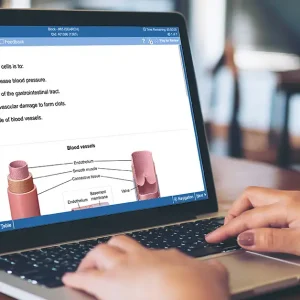If gaining acceptance into medical school was a battle (and it can be), consider your letters of recommendation your secret weapons.
Superlative letters of recommendation, submitted on time and fulfilling all requirements, can elevate you above your peers. Conversely, uninspired letters of recommendation, or those submitted late and without attention to detail, can sink your admissions prospects.
There is no overstating the importance of the letters submitted on your behalf. These are crucial components in your application process for medical school. And the reason is simple . . .
Admissions committees are searching for
differentiators between you and other students.
In a sea of applicants with matching MCAT® scores, related research experience, and analogous academic performances, outstanding letters of recommendation can be the spotlight that illuminates your application.
And here is the good news: Letters of recommendation are the one component of the AMCAS that you don’t have to write. Sure, it can be nerve wracking to know something is out of your control, but there is also a freedom in sitting back and letting others you respect and trust document your brilliance.
Here are 4 often asked questions about gathering letters of recommendation for med school and answers to help you during this process:
How Many Recommendation Letters Do I Need?
This varies from school to school, but a majority of medical schools require a minimum of three letters of recommendation. There are other schools that ask for four or five letters.
Whatever the minimum requirement, do your research to see if your schools of interest allow for more letters above the minimum..
The most ambitious and competitive applicants will submit as many as six letters of recommendation (as long as their dream school permits that many).
Avoid the temptation to submit too many letters of recommendation. At the end of the day, it’s not the quantity of the letters but the quality that will help you stand out.
Whom Should I Ask To Write Letters on My Behalf?
Generally speaking, recommendation writers will include:
- Science professor (biology, chemistry, biochemistry, physics)
- Non-science professor
- A physician whom you’ve shadowed or has seen you volunteering in a healthcare position
- Research director
- Extracurricular or volunteer observer (particularly if it is medical-related)
- Employer
Remember, check carefully with the schools you are interested in to see what they require. Many medical schools are very specific about the letters of recommendation that must be submitted. Harvard Medical School’s Letters of Evaluation web page is a good example.
When choosing recommenders from the appropriate categories, avoid anyone you aren’t confident will use superlatives in describing you. A neutral letter of recommendation, or simply a nice recommendation, doesn’t leave a significant impression.
Choose individuals who can speak knowledgeably about your academic and professional qualities with effusive, highly-complementary language.
What Can I Do To Help My Recommenders?
Reminding your recommenders who you are, your performance in their department, class, or under their employ, and why you have a passion for medicine is always a good idea.
Give your recommenders the information they need to write a glowing report. A copy of your personal statement, your CV, your transcript, a list of any accomplishments not included in your CV — these can help your recommenders better advocate for you, especially if they don’t know you extremely well (e.g., a senior faculty member)
When and How Should My Letters of Recommendation Be Submitted?
Let’s start with the “how” . . .
You won’t actually submit your letters of recommendation, your recommenders will submit them in the AMCAS Interfolio or Letter Writer Application. Keep in mind, your recommendation writers will need both the AMCAS letter ID and the AAMC ID that is found on your official Letter Request Form.
As for the “when” . . .
The majority of medical schools only read letters of recommendation after your primary application, secondary application, MCAT score, and fees have all been submitted.
So, it is best to have recommenders submit their letters in the AMCAS Interfolio or Letter Writer Application in correspondence with your secondary application submission. Map out your application process in advance so you know what this date will be.
For example, if you are applying to begin medical school in the fall of a year, you’ll want to ask your recommenders to submit their letters of recommendation by the end of June in conjunction with your secondary application timeline. (This is a bit early, but it gives you some wiggle room in case recommenders are late with their submissions.)
Impressive recommendation letters help you stand out from the competition, but do you know what else does? SUPERIOR MCAT SCORES! If you are preparing for an upcoming MCAT exam, discover why UWorld is far and away the most trusted test preparation tool for medical students. Begin your FREE trial today.




